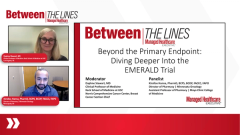
Baseline Characteristics of the Emerald Trial and the Importance of an ESR1 Mutation
The EMERALD trial enrolled patients with ER+/HER2- metastatic breast cancer who had progressed on prior endocrine therapy, including mandatory exposure to a CDK4/6 inhibitor, reflecting a modern and clinically relevant population.
Episodes in this series

The EMERALD trial enrolled patients with ER+/HER2- metastatic breast cancer who had progressed on prior endocrine therapy, including mandatory exposure to a CDK4/6 inhibitor, reflecting a modern and clinically relevant population. Participants were heavily pretreated, with many presenting with visceral disease, highlighting the need for effective therapies in later-line settings. A key feature of the baseline evaluation was comprehensive genomic testing to determine ESR1 mutation status. ESR1 mutations, which commonly emerge after aromatase inhibitor therapy, are a major driver of endocrine resistance and influence treatment responsiveness. Their identification proved essential within the trial, as patients harboring these mutations demonstrated a more pronounced benefit from the oral SERD compared with standard endocrine options.
Newsletter
Get the latest industry news, event updates, and more from Managed healthcare Executive.






















